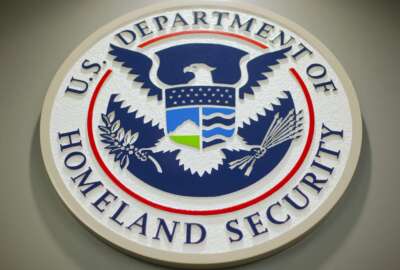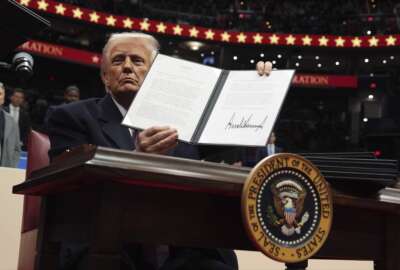The government’s best intelligence entity may not be the agency you think it is
In a world where usable intel is more important than ever to decision-making, INR seems to have gotten more right about world events than most.
When thinking about agencies that gather intelligence, the State Department’s Bureau of Intelligence and Research might not come to mind. Yet, in a world where usable intel is more important than ever to decision-making, the bureau seems to have gotten more right about world events than most. Dylan Matthews is a senior correspondent with Vox, who recently profiled some of the bureau’s accomplishments. He talked about it on the Federal Drive with Tom Temin.
Interview Transcript:
Dylan Matthews
The Hall of Fame for INR would include, I think in Vietnam, they were very skeptical of South Vietnam’s approach and the plausibility of using bombing campaigns and US troops to force concessions. They were kind of a thorn in the side of first the Kennedy, and then the Johnson administration, and had sort of more power, and thus more accurate predictions of about what’s going to happen. They had some notable good calls in the 70s, a few months before, the Yom Kippur War predicted that Egypt would invade Israel with a coalition of Arab states. They turned out to be right about that. The WMD incident that I mentioned us now they were the sole agency to dissent in the national intelligence estimate about its conclusions regarding Saddam Hussein wanting or working to pursue nuclear weapons. They agree on nuclear weapons, but they disagreed that the evidence the CIA and DIA are putting forward was conclusive of that. And then most recently, they were notable, and I don’t think they were alone in this, but I think they got some credit for being particularly strident on that in arguing that Ukraine would hold its own against Russia. If people recall, in late February 2022, when the war started, our the full scale invasion started. There was a lot of speculation that Russia would sort of make it the key of top of the government win very quickly. And that didn’t end up happening. And I think INR was one of the dissenters arguing that it wouldn’t happen and that Ukraine would hold them off.Eric White
And so you’d spoken a little bit about it with your family being members of the State Department and how they spoke highly of the INR. What is the general sense of the iron ours reputation in intelligence circles? Did you find out anything about that of what maybe other intelligence agencies are saying about it?Dylan Matthews
One person referred to it as the redheaded stepchild of the intelligence community, I think lovable rascal was a term I heard. But I think there’s a reputation that they’re very studious and bookish. It’s a lot for academics, a lot of PhDs that they kind of like being a thorn in the side of other agencies that they are sort of delight in being the footnote writer as being the dissenters. But they have some wins. So I think the reactions I got ranged from straightforward respect to grudging respect. And I think a fair bit of pushback that I got from some people was, we don’t really know how much better their record is than some other agencies, because so much of the stuff is still classified. And that’s totally fair. There’s a lot I know that I don’t know about the track record of these agencies. But there seems to be pretty broad respect for it within the intelligence community as well.Eric White
I was speaking with Dylan Matthews from Vox. And so when it comes to the INR itself, can you tell me a little bit about the makeup of it. Because while it is fair to say who knows how much better they are at predicting things, they are also doing so with virtually no technology to help them out, and no real spies abroad or anything like that. Do they have sources like that? Are they purely academic, as you had mentioned?Dylan Matthews
They don’t have spies, they do have some sort of forms of intelligence collection. I think they sometimes say that they’re the only agency that doesn’t have collection. And that’s true, sort of. But they do have close connections with foreign service officers all around the globe, and embassies they can share information and are very embedded in these communities. And can of course, also share that with other agencies, but I think have closer ties to INR which helps INR. Another source of information, they have this kind of distinctives, they have a polling unit. They have a few dozen staffers working on public opinion research all across the world. And that was part of their secret in Ukraine, is that they were conducting surveys of people in eastern Ukraine who are Russian speakers, rather than Ukrainian speakers, who you might have expected to be more sympathetic to the Russians and to make life easy for them or at least not make life hard for them. And their polling suggested that wouldn’t be the case. They might speak Russian, but they’re Ukrainian nationalists. They will fight back against foreign invaders. And so those are forms of, not sort of cloak and dagger, human asset stuff or spy satellite stuff, but it is a form of collection.Eric White
Yeah. And it’s definitely not the fun kind that we would see in the movies or anything, but it seems as if they’re just doing the nitty gritty research work, which I guess makes sense since research is part of the name. Does that mean that they highlight other areas of research like that, maybe some other agencies don’t have have the time or the personnel to be able to do that kind of work?Dylan Matthews
I think they’re reactive and focused on present day events in the way that other intelligence agencies are. So it’s not a historical research institute. People aren’t digging into the archives and doing multi year projects. That being said, I think one of the most notable aspects of INR is that they keep people on portfolios for a very long time. So I think the median IRS staffer has been on their desk on their countries for 15 plus years. And you can contrast that to DIA or CIA where people are traditionally rotated after two or three years. You can also contrast it to the Foreign Service where that happens. And I think one thing I heard from a lot of people is that, that means that the literal people there have often been doing years of research that goes back into what would now be considered history. There were people there who started in the 1980s. And so sort of observed the fall of the Berlin Wall and real time, and so they just as institutional memory can bring some of that sort of deeper research to bear on questions.Eric White
And you provide me a perfect segue for my final question, which I guess kind of starts at the beginning, maybe I should have just started with this. How did this wing of the State Department get started? The State Department was pretty much created after the two major wars. Were they an integral part of the beginning of the State Department? What was their role from the beginning?Dylan Matthews
So they weren’t sort of part of the diplomatic corps for the 19th century. Their origins actually come from a branch of army intelligence that what’s known as official listeners who like spy history who are probably familiar with, which is the Office of Strategic Services (OSS). Which was run by a very sort of flamboyant guy named Bill Donovan, who would do things like bring a silenced pistol into the Oval Office and fire it at sandbags to show FDR how silent it was. But he had all these agents all across sort of Europe, in North Africa, during World War II. But he also had a research and intelligence arm in DC. And that through some sort of bureaucratic drama, evolved into INR, and sort of what we currently know as INR was created in by an order of Secretary of State George Marshall in 1947. And some INR folks like to point out that was a few months before the CIA was created. And it’s sort of a great debate over whether the US should have a Central Intelligence Agency, whether it wanted a permanent sort of intelligence apparatus. Truman was very sort of skeptical of that and have kind of civil liberties worries about it. But it was sort of founded around that time and I think was very quickly eclipsed by the CIA and prominence and budget. But it ties back to that history in World War II and to the OSS.
Copyright © 2025 Federal News Network. All rights reserved. This website is not intended for users located within the European Economic Area.
Eric White is news anchor and Federal Drive producer at Federal News Network.
Follow @FEDERALNEWSCAST






